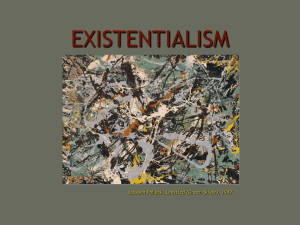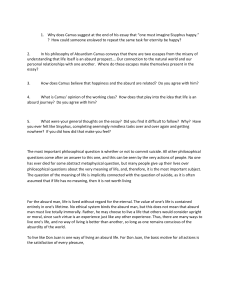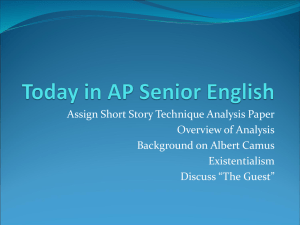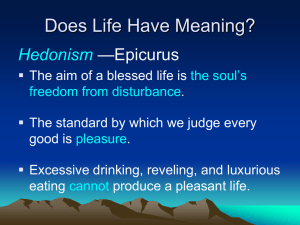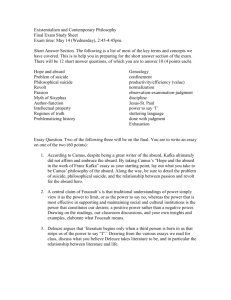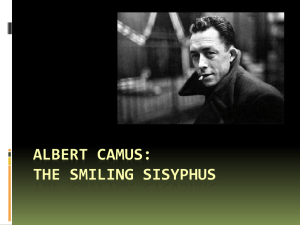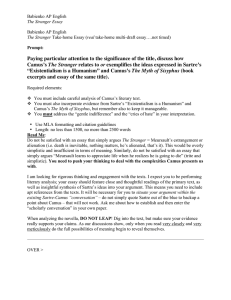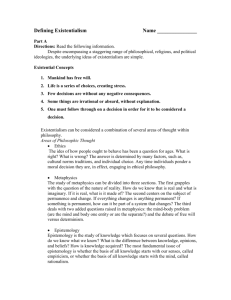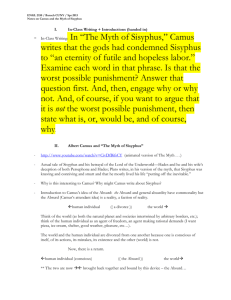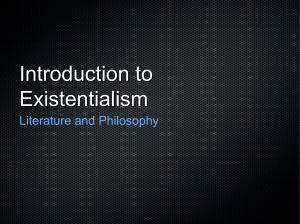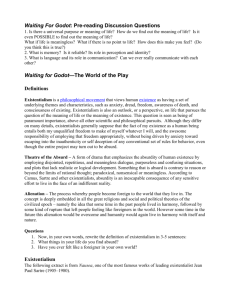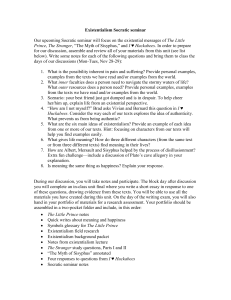In a universe that is suddenly deprived of illusions and of light, man
advertisement
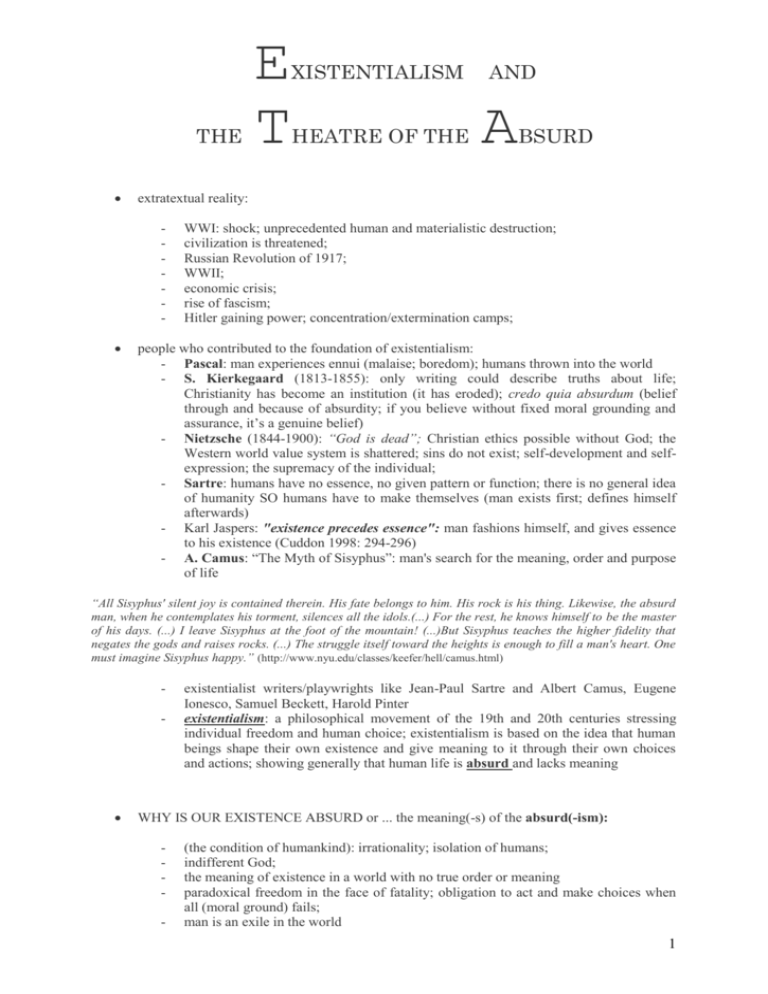
E T XISTENTIALISM THE A BSURD extratextual reality: - HEATRE OF THE AND WWI: shock; unprecedented human and materialistic destruction; civilization is threatened; Russian Revolution of 1917; WWII; economic crisis; rise of fascism; Hitler gaining power; concentration/extermination camps; people who contributed to the foundation of existentialism: - Pascal: man experiences ennui (malaise; boredom); humans thrown into the world - S. Kierkegaard (1813-1855): only writing could describe truths about life; Christianity has become an institution (it has eroded); credo quia absurdum (belief through and because of absurdity; if you believe without fixed moral grounding and assurance, it’s a genuine belief) - Nietzsche (1844-1900): “God is dead”; Christian ethics possible without God; the Western world value system is shattered; sins do not exist; self-development and selfexpression; the supremacy of the individual; - Sartre: humans have no essence, no given pattern or function; there is no general idea of humanity SO humans have to make themselves (man exists first; defines himself afterwards) - Karl Jaspers: "existence precedes essence": man fashions himself, and gives essence to his existence (Cuddon 1998: 294-296) - A. Camus: “The Myth of Sisyphus”: man's search for the meaning, order and purpose of life “All Sisyphus' silent joy is contained therein. His fate belongs to him. His rock is his thing. Likewise, the absurd man, when he contemplates his torment, silences all the idols.(...) For the rest, he knows himself to be the master of his days. (...) I leave Sisyphus at the foot of the mountain! (...)But Sisyphus teaches the higher fidelity that negates the gods and raises rocks. (...) The struggle itself toward the heights is enough to fill a man's heart. One must imagine Sisyphus happy.” (http://www.nyu.edu/classes/keefer/hell/camus.html) - existentialist writers/playwrights like Jean-Paul Sartre and Albert Camus, Eugene Ionesco, Samuel Beckett, Harold Pinter existentialism: a philosophical movement of the 19th and 20th centuries stressing individual freedom and human choice; existentialism is based on the idea that human beings shape their own existence and give meaning to it through their own choices and actions; showing generally that human life is absurd and lacks meaning WHY IS OUR EXISTENCE ABSURD or ... the meaning(-s) of the absurd(-ism): - (the condition of humankind): irrationality; isolation of humans; indifferent God; the meaning of existence in a world with no true order or meaning paradoxical freedom in the face of fatality; obligation to act and make choices when all (moral ground) fails; man is an exile in the world 1 - language as a barrier to communication world deprived of illusions BUT the recognition that there is no simple explanation for all the mysteries of the world, that all systems are bound to fail is a gift (we may have to live without any final truths; accept the fate but do sth about it: like Sisyphus) Absurdist Theatre (or Theatre of the Absurd) emerged in the late 50s name given by Martin Esslin (absurd meaning ridiculous; illogical; out of harmony) in the 1960's influenced by existentialism plays abandon rationality (also in lg), plot, probable characters; metaphorically address the issue of "ending" or "dying" Existentialism and the Absurd in Samuel Beckett's (1906-1989) plays o o born in Ireland; moved to Paris; introduced to James Joyce; stabbed in the street by a man who had approached him asking for money; during World War II, joined the underground movement and fought for the resistance; 1969 he was awarded the Nobel Prize for Literature Waiting for Godot (written and first performed in French in 1954), Endgame, the novels Malloy, Malone Dies, The Unnamable meaningless and entropic life (a concept from thermodynamics: a tendency towards disorder; the ultimate degradation of matter and energy to an inert uniform state incapable of sustaining life) life means waiting, killing time and clinging to the hope that relief may be just around the corner, if not today, then perhaps tomorrow God is invisible and distant and uncaring; speech tends towards silence; language is useless: lg full of cliches and pointless repetitions; BUT dico ergo sum (I speak, therefore I exist); so people struggle vainly to express the unexpressable, grotesquely attempting some form of communication; after some time it is reduced to silence people talk at each other not to each other symbolic language (Godot); barren set maladjusted, almost immobilized and passive characters exist in a terrible dreamlike vacuum; those clown-like characters going through life because they don't know what else to do no choice is good; afraid to be alone in such world: each character relies on the other for comfort, support, and most of all, meaning (they need one another in order to avoid living a lonely and meaningless life) deprived of memories so they lack identity (and hope) time is circular: Vladimir and Estragon may forever be "waiting for Godot" References and recommended reading: Brosman, Catherine Savage. 2000. Literary Topics: Existential Fiction. Volume 8. Gal Study Guides to Great Literature. New York: The Gale Group. Cuddon, J. A. 1998. The Penguin Dictionary of Literary Terms and Literary Theory. London: Penguin Books. Sikorska, Liliana. 2007. A Short History of English Literature. Poznań: Wydawnictwo Poznańskie. additionally: http://samuel-beckett.net/Waiting_for_Godot http://www.nyu.edu/classes/keefer/hell/camus.html 2 http://marveldirectory.com/glossary Katarzyna Bronk, MA 3
